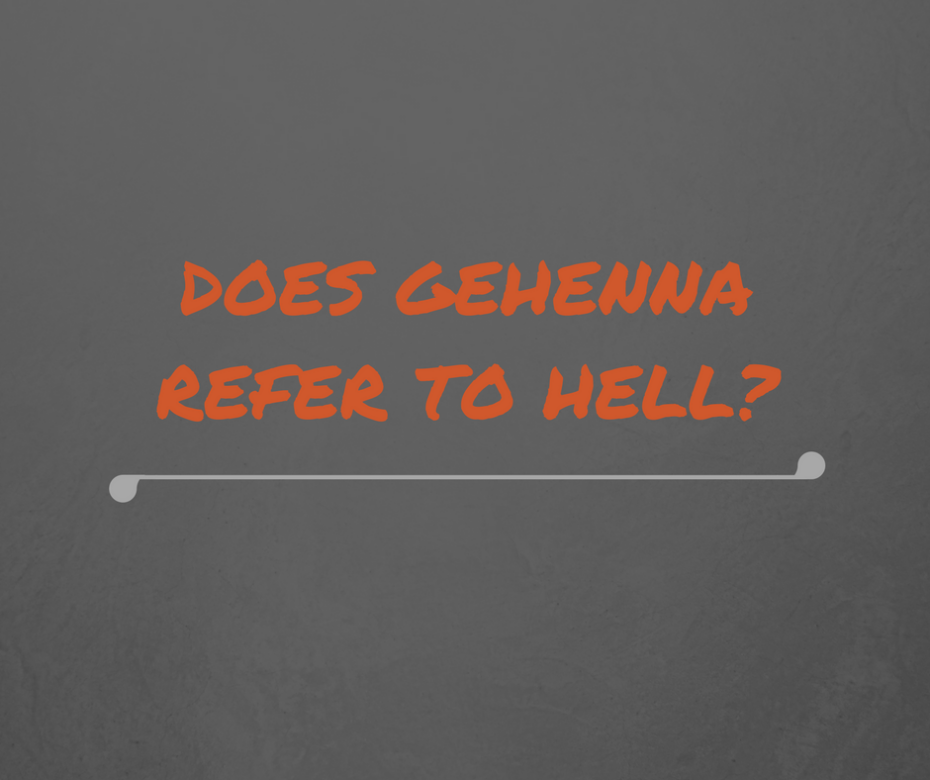I am researching the topic of eternal conscious torment (ECT) for a series of blog posts, and a possible book(let).
While there are many modern books defending annihilationism and universalism, there are few defending ECT. And none (that I know of) are written from a Dispensational, Free Grace perspective.
One popular ECT book is John Gerstner’s (1914-1996) Repent or Perish, published in 1990. So it’s not very recent, and currently out of print.
While I agree with Gerstner’s general position on ECT, he gets some passages very wrong, guided by his Reformed theology.
For example, Gerstner cites Matt 5:22-26 as a proof-text about ECT. There, Jesus warned that if you call someone a “fool” you’re in danger of going to “a fiery hell.” What’s that? Gerstner took it as reference to ECT.
The language of “a fiery hell” certainly sounds like ECT, doesn’t it? So isn’t it obvious that’s what Jesus was warning about?
Actually, no, it isn’t.
The Greek for “a fiery hell” is actually Gehenna, a reference to the Valley of Hinnom outside of Jerusalem. That valley had a wicked history—including being a place of human sacrifice. Whatever the term Gehenna might have come to mean, it was definitely not a reference to ECT. Originally, it was like referring the really, really, really bad part of town. “If you don’t watch your mouth, I’m going to drop you off in the middle of Somalia!”
But as you know, the meaning of a word can change over time. That’s true of Gehenna. What did Jesus mean when He referred to it? Was it a reference to ECT?
Gerstner thought it was.
So did John Walvoord. “All the references to gehenna, except James 3:6, are from the lips of Christ himself, and there is an obvious emphasis on the punishment for the wicked after death as being everlasting” (Four Views, 20). Elsewhere, he confirms, “In Scripture, gehenna is a synonym for the lake of fire, or the eternal state, in contrast to the temporary state of Hades” (Major Bible Prophecies, 410). It looks like he would agree with Gerstner.
But many Free Grace commentators say that is mistaken.
In The Grace New Testament Commentary, Hal Haller argues that Jesus was addressing unbelievers, those “trusting in pharisaic righteousness, not those who have been saved by grace through faith alone” (1:26). And Gehenna was not a reference to hell, “but to the temporal and physical judgment that may result from sinning” (1:27).
In The Ten Most Misunderstood Words in the Bible, Bob Wilkin argues that “Gehenna might sometimes be a synonym for the lake of fire, and on other occasions, it might be a reference to temporal judgment” (p. 93).
In his book Final Destiny, Joseph Dillow argues that this punishment—
“does not refer to final damnation. Instead, when applied to believers, it is a metaphor for a negative assessment of one’s life. The phrase speaks of shame and disgrace. Due to failure and lack of perseverance in faith, at the Judgment Seat of Christ a believer’s life can be assessed to be of no more value than a corpse tossed into a garbage dump (Gehenna was a burning garbage dump in the Valley of Hinnom outside the walls of Jerusalem)” (2013 first printing, p. 851; cf. 891).
In Keys to Kingdom Greatness, Steve Elkins argues that Jesus was explaining the legal standard of the Millennial Kingdom, where the Law has been re-instituted and is even stricter than under Moses. Being in danger of Gehenna likely means, “Such an act gets the death penalty, your body for buzzards and to be burned” (p.172; cf. chap 13).
Likewise, Kent Young, in Theirs Is the Kingdom, argues that this is a judgment of believers within the Millennial Kingdom: “It is kingdom judgment for believers, not eternal damnation for the unsaved, that Jesus has in view in this passage” (p.75).
You get the picture.
I’m not sure of the right answer. Does Gehenna refer to the place of eternal torment or Millennial discipline?
I don’t know.
There’s lots of work for me to do. But what I do know is that a future book defending ECT will probably take very different interpretations of some traditional ECT prooftexts.
Here at GES, we are very clear about the good news of eternal life. But we can’t do that without also spelling out the bad news. It’s not a popular topic, but it’s also not optional. As J. C. Ryle said, “It is not possible to say too much about Christ. But it is quite possible to say too little about hell” (Expository Thoughts on Mark, p. 194).


